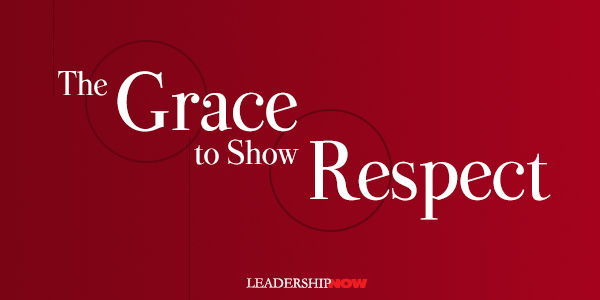 |
 |
04.29.20

The Grace to Show Respect
IF WE are to be successful, we need to collaborate. We don’t have the whole story. Collaboration is founded on a bedrock of respect. John Baldoni writes in Grace: A Leader’s Guide to A Better Us, “Our culture has become more coarsened. The rancor in our political system, fueled as it is by people who do not want to listen to one another, paralyzes so much of our public discourse.” It is difficult to find a voice today that is not hindered by personal biases, political affiliations, pandering, sarcasm, and name-calling. We all need—and leaders, especially—a good dose of grace. We stop listening when we think we know all there is to know, and we are convinced we are right. We believe that belittling other’s ideas that are in opposition to our own becomes a necessary step in protecting our own views. Instead, ask yourself, Why are they making that choice? Tom Peters wrote in The Little Big Things, “Connect! Listen! Get the Story! (Remember: Everyone [every single one] has a story.)” In a time of crisis, we have to remember that not only do we not know everything, but those we look to for answers, don’t know everything. We have to assume, as former CEO and Chairman of Aetna Ron Williams advocates, positive intent. We must assume that others are motivated by positive intentions. He writes in Learning to Lead that assuming positive intent is an “empowering strategy that disarms defensiveness and turns potential enemies into allies. If there’s something that will make you feel really good to say—something you are itching to say—don’t say it. Blowing up in the face of provocation is a way of losing power, not of claiming it.” Peters goes further to say that he’s “stuck on, hooked on, wedded to,” the word thoughtfulness. Thoughtfulness is “transactional,” and it “applies literally to every internal and external activity, as well as being something that resides deep within.” He adds that thoughtfulness speeds things up and reduces friction, and “it abets rather than stifles truth-telling.” And it matters most when there is disagreement. Change management consultant Paul Meshanko, writing back in 2013 in The Respect Effect, perfectly describes the mental process through which we arrive at, and justify our disrespect of others:
In the heat of the moment, when faced with vastly divergent opinions and approaches, it is difficult to remember thoughtfulness, positive intent, respect, and grace. It is easy to give another respect when they are respectable. It’s another thing to give it when they are not. When we are in that situation, it requires that we call up something much deeper from inside ourselves. Grace is giving something of ourselves to others though it is unearned or undeserved. Demonstrating grace, like forgiveness, kindness, service, and respect, says more about who we are than who they are. It is about us, not them. Grace, says Baldoni, “enables us to take the higher road, to think more clearly.” In our times, that’s what we need. That’s true leadership.
Posted by Michael McKinney at 12:02 AM
|
BUILD YOUR KNOWLEDGE
 

How to Do Your Start-Up Right STRAIGHT TALK FOR START-UPS 
Grow Your Leadership Skills NEW AND UPCOMING LEADERSHIP BOOKS 
Leadership Minute BITE-SIZE CONCEPTS YOU CAN CHEW ON 
Classic Leadership Books BOOKS TO READ BEFORE YOU LEAD |